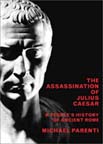 by Carlin A. Barton "Though thoroughly grounded in the ancient writings-especially the work of Seneca, Cicero, and Livy-this book also draws from contemporary theories of the self and social theory to deepen our understanding of ancient Rome. Barton explores the relation between inner desires and social behavior through an evocative analysis of the operation, in Roman society, of contests and ordeals, acts of supplication and confession, and the sense of shame. As she fleshes out Roman physical and psychological life, she particularly sheds new light on the consequential transition from republic to empire as a watershed of Roman social relations. "
by Carlin A. Barton "Though thoroughly grounded in the ancient writings-especially the work of Seneca, Cicero, and Livy-this book also draws from contemporary theories of the self and social theory to deepen our understanding of ancient Rome. Barton explores the relation between inner desires and social behavior through an evocative analysis of the operation, in Roman society, of contests and ordeals, acts of supplication and confession, and the sense of shame. As she fleshes out Roman physical and psychological life, she particularly sheds new light on the consequential transition from republic to empire as a watershed of Roman social relations. "
Subsection of Roman Times:
My personal book reviews and news about upcoming books and novels set in the ancient world.
Wednesday, November 12, 2003
Roman Honor: The Fire in the Bones
 by Carlin A. Barton "Though thoroughly grounded in the ancient writings-especially the work of Seneca, Cicero, and Livy-this book also draws from contemporary theories of the self and social theory to deepen our understanding of ancient Rome. Barton explores the relation between inner desires and social behavior through an evocative analysis of the operation, in Roman society, of contests and ordeals, acts of supplication and confession, and the sense of shame. As she fleshes out Roman physical and psychological life, she particularly sheds new light on the consequential transition from republic to empire as a watershed of Roman social relations. "
by Carlin A. Barton "Though thoroughly grounded in the ancient writings-especially the work of Seneca, Cicero, and Livy-this book also draws from contemporary theories of the self and social theory to deepen our understanding of ancient Rome. Barton explores the relation between inner desires and social behavior through an evocative analysis of the operation, in Roman society, of contests and ordeals, acts of supplication and confession, and the sense of shame. As she fleshes out Roman physical and psychological life, she particularly sheds new light on the consequential transition from republic to empire as a watershed of Roman social relations. "
The Assassination of Julius Caesar: A People's History of Ancient Rome
 By Michael Parenti
By Michael Parenti
"Why did a group of Roman senators gather near Pompey's theater on March 15, 44 B.C., to kill Julius Caesar? Was it their fear of Caesar's tyrannical power? Or were these aristocratic senators worried that Caesar's land reforms and leanings toward democracy would upset their own control over the Roman Republic? Parenti (History as Mystery, etc.) narrates a provocative history of the late republic in Rome (100-33 B.C.) to demonstrate that Caesar's death was the culmination of growing class conflict, economic disparity and political corruption. He reconstructs the history of these crucial years from the perspective of the Roman people, the masses of slaves, plebs and poor farmers who possessed no political power. "
Tuesday, November 11, 2003
Sailing The Wine Dark Sea
 By Thomas Cahill
By Thomas Cahill
Review by Joy Connolly
Thomas Cahill's ''Sailing the Wine-Dark Sea'' is the fourth book in a best-selling series that treats Western history as a long chain of gift-giving to the world, where the gifts are art, literature, political and moral values, science and philosophy. He is a talented writer, and his tour of Greek culture is a triumph of popularization: extraordinarily knowledgeable, informal in tone, amusing, wide-ranging, smartly paced. We learn much from him about Greek achievements, from Homer's epic vision to the importance of free speech, from the development of the disciplined war machine the Greeks called the phalanx to Plato's love of reason. Cahill has produced an updated version of Edith Hamilton's beloved ''Greek Way'' of 75 years ago, one that is much more sensitive to the Greeks' oppression of women and uncritical endorsement of slavery, their tinges of xenophobia and the fearsome nature of their war making. But -- and this is a significant exception -- to point out that good and important things were achieved in the past doesn't show why they matter now.
This may seem an ungenerous reaction to a book that does great service to classical culture and those who teach it. But right here, right now in American history, the promise of his subtitle, ''Why the Greeks Matter,'' carries a heavier burden than Cahill is willing to acknowledge.
Subscribe to:
Posts (Atom)